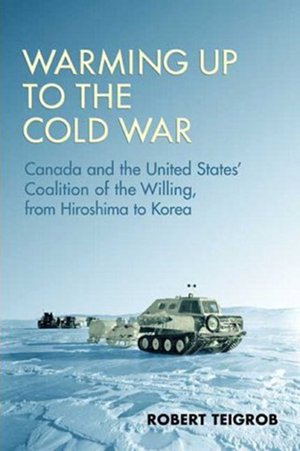Warming Up to the Cold War:
Canada and the United States' Coalition
of the Willing, from Hiroshima to Korea

Support Canada's History in other ways (more)
by Robert Teigrob
University of Toronto Press, UTP, 2009, $24.95
The years following the Second World War marked a watershed in Canada’s maturing political culture. Two recent books examine the complexity of this period, notably the interplay between government decisions and public values. Both books look at relations with the United States — military relations, chiefly — and how these affected Canada’s sovereignty, industrial development, and sense of its national interests.
In Warming Up to the Cold War, Robert Teigrob focuses on the immediate postwar period from 1945 to 1950. He examines five major issues facing Canada and the world: nuclear arms proliferation and civilian nuclear programs; Soviet espionage following the Gouzenko affair; anti-colonial movements; multilateralism, notably through NATO; and Canada’s military role in Korea.
Teigrob’s thorough academic style does not hide his unhappiness with decisions and attitudes from that period. Surveying Canada’s posture in those early Cold War years, he asks, with evident sadness: “What led Canadians to sign on with such apparent enthusiasm to a battle, and wider global confrontation, which was built so firmly upon the discourses of American nationalism?”
The central point in this densely written study is that American media culture, carried by newspapers and radio, was the primary force shaping Canadian public opinion on international issues. Teigrob’s arguments are at times flat and mechanistic, portraying Canadians as having few opinions of their own, waiting to be guided by American mass media.
The book does draw attention to other influential voices, including traditional British-oriented elites and some social liberals. Teigrob concedes that Canadians themselves chose a firm anti-communist stance and did not support a vague alignment of international neutrality with a renewed Commonwealth in order to counter American power. He concludes that “Canada became a satellite, in part, through an act of volition.”
There is a tension in Teigrob’s study that is never resolved to my satisfaction. While he makes a valuable addition to our knowledge of media commentary in the U.S. and Canada, he remains tied to the thesis that “the Canadian public had been manoeuvred toward the pro-U.S. anti-communist consensus.” He underestimates the independent desire of Canadians to reject appeasement of communism, as well as their capacity to recognize that Britain’s place in world leadership had been replaced by America. Support here for the Western alliance was based on many factors, including the political judgment of hundreds of thousands of Canadian veterans who had just served in the war against fascism.
— Victor Rabinovitch (Read bio)
Victor Rabinovitch former president of the Canadian Museum of Civilization (now the Canadian Museum of History), chair of Ottawa's Opera Lyra company, and an adjunct professor at Queen's University.